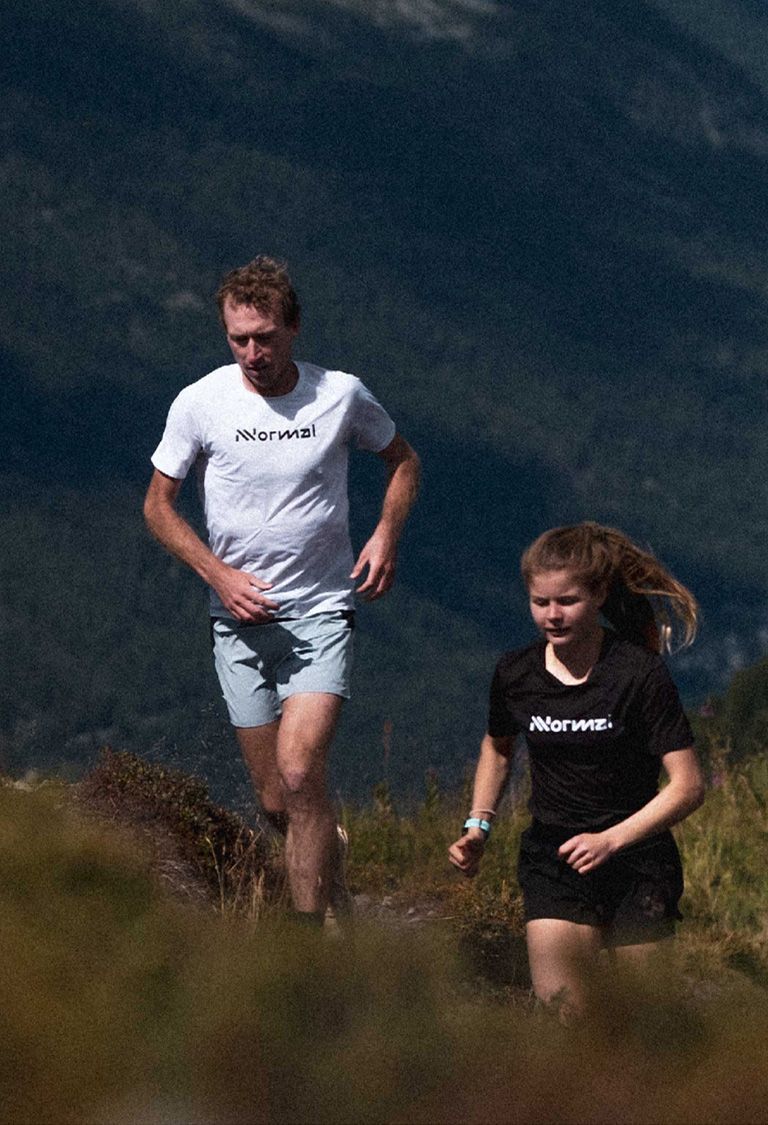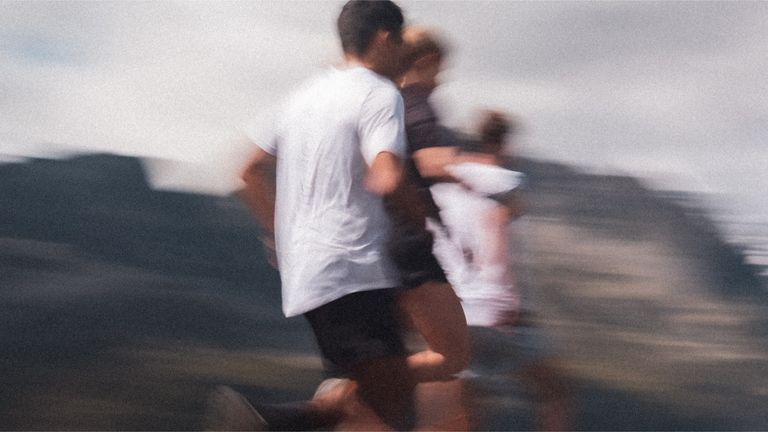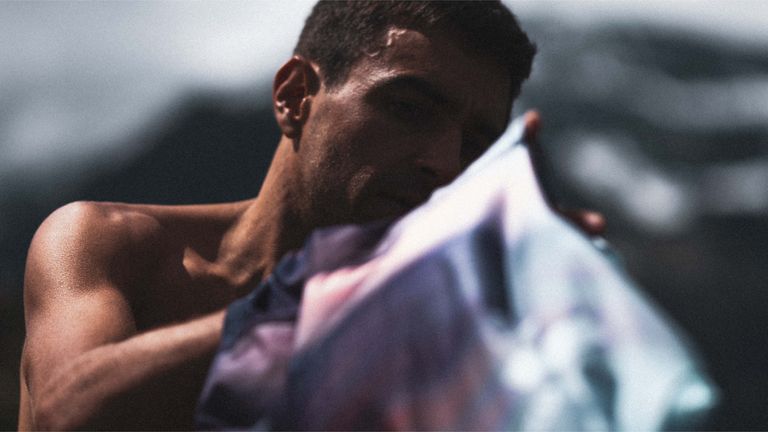
A beginner's guide to trail running

Amb el suport de Dakota Jones
Facing new challenges, practising sport surrounded by nature or following in the footsteps of Kilian Jornet, these are just some of the reasons why more and more people are taking up this sport every year.
With NNormal's beginner's guide to trail running, you'll learn the basics and get ready to explore challenging terrain. From what it is to how to train, hydrate and equip yourself properly, we want to explain everything you need to know to get off to a good start.
Embrace the mountains and push your own limits!
What is trail running?
Trail running is a form of running that takes place on nature trails, forest tracks, mountains or other terrain outside of urban environments. Unlike conventional running on paved roads, this discipline is all about running in natural environments, which often involves more rugged terrain, steep inclines, wild animals and a variety of natural obstacles. This discipline offers a unique connection to natural ecosystems and a different physical and mental challenge to road running, appealing to runners seeking adventure, exploration and direct contact with nature.

Physical preparation for trail running
If you're ready to explore this exciting world, you'll need more than just courage and a lot of willpower. Physical preparation is key to tackling challenging terrain and unpredictable conditions. At NNormal, we suggest the following approach to your training:
- Build endurance: The first piece of advice we want to give you in our beginner’s guide to trail running is to train your ability to maintain your pace for long periods; it is fundamental. This will allow you to face distances and challenges with confidence.
- Targeted strength work: Prepare for technical and variable terrain by strengthening the muscles you need to tackle it. From ankles to core, every part of your body plays a crucial role in your performance on the trails.
Remember, patience is key when embarking on a new adventure. Gradually increase the intensity and duration of your workouts to avoid injury and maximise your progress - get ready to conquer the trails with determination and solid fitness!
Endurance is everything
A basic exercise regime is as crucial as in any other endurance discipline. This will enable you to prolong your activity for longer, while gradually increasing the workload as you level up. An endurance-focused workout needs to be executed at a moderate intensity. Therefore, you should not overdo the speed and do longer sessions, considering that facing ascents is a very common practice in this modality. You can improve your intensity levels by doing other supplementary activities, such as cycling, hiking or swimming.
Get ready for your trail run
Whether you are taking your first steps in trail running or you have experience running on paved roads, it is crucial to adjust your physical preparation for the specific challenges you will face in nature.
- Stability on variable terrain: Develop balance and body awareness to adapt to unstable terrain.
- Challenging uphill runs: Improve your strength and coordination to overcome slopes.
- Technical descents: Strengthen your core, maintain balance and learn to read the challenges of the terrain.
Mixing your training routines not only improves your adaptability, but also keeps your motivation high.

Nutrition and Hydration in Trail Running
It goes without saying that, for any type of sport, it is essential to maintain a healthy and balanced diet. In this case, as it is a discipline that requires a significant energy expenditure, you should increase your intake at each meal and, if possible, opt for healthy, organic and unprocessed foods. We'll also go over the best hydration tips for trail races, which are essential to keep your performance at its peak. With proper nutrition and hydration, you'll be ready to conquer any trail that comes your way.
Basic diet for trail runners
We are not going to present a specific diet in this beginner’s guide to trail running, as we believe that each person has their own tastes and dietary preferences. However, we would like to propose a series of nutritional tips and guidelines to maximise your performance in the mountains:
- Carbohydrates: Prioritise foods rich in complex carbohydrates such as rice, wholegrain cereals, pasta, potatoes and sweet potatoes, among others. It's not about bingeing on carbohydrates, but about including these foods in every meal. These foods provide sustained-release energy, which will help you maintain a steady level of energy during your runs.
- Protein: Protein is essential in a trail runner’s diet, especially for muscle repair and prevention of injury from physical wear and tear. Examples of such foods include meat, fish, eggs, pulses and legumes. Red meat should be avoided to a greater extent, as it is not as beneficial for our bodies as lean meat.
- Fats: Healthy fats are an important source of energy for running, especially long distance running. Incorporate healthy fats into your diet from foods such as avocados, nuts, seeds, olive oil and oily fish. These fats provide slow-release energy and help maintain satiety during prolonged periods of exercise.
In the days leading up to a competition or training session, avoid eating dairy and high-fibre foods to avoid unexpected setbacks.
What to eat and drink during a race?
During a trail running race, it is crucial to maintain adequate food and fluid intake to keep your energy, hydration and performance at peak levels. Here are some tips on what to eat and drink while in a race:
What to eat during a race?
- Nuts: Eating nuts such as walnuts, sultanas, hazelnuts or almonds are an excellent source of protein and quick-release fats during a run. They are easy to carry and provide a quick energy boost when you need it most.
- Fruit: It is popular for runners to eat fruit, such as bananas. They are easy to digest and can help prevent muscle cramps due to their potassium content.
- Energy bars: At times when your strength seems to be flagging, it is a good option to take energy bars to provide carbohydrates, protein and healthy fats during the race. These solutions can give you the energy boost you need to perform at your best.
What to drink during a race?
- Water: Drinking the right amount of water while running will help keep you hydrated. In sports like trail running, where terrain conditions and temperature make a difference, it is crucial to stay hydrated at all times. Carry water bottles with you, or if you prefer, running vests equipped with hydration pouches become your best ally in maintaining a constant supply of fluids.
- Energy drinks: Consider taking sports drinks that contain electrolytes such as sodium and potassium, as well as carbohydrates. These drinks help replenish electrolytes lost through sweat and provide additional energy to maintain performance.
- Energy gels: Energy gels are a convenient source of fast-absorbing carbohydrates during the race. These gels will help in times of possible weakness and help you recover energy quickly. Be sure to drink water after consuming a gel to facilitate absorption.

What equipment do I need to get started?
When you start practising any kind of sport, it is essential to be well equipped. Here, as in conventional running, you need a number of basic pieces of equipment, although they need to be adapted for the natural environment to be more resistant:
- Trail running shoes: Select running shoes that are specifically designed to cope with uneven and challenging terrain. This type of shoe is tougher and more durable than conventional shoes. At NNormal, we offer shoes for all levels of runners. We recommend the Tomir for beginners and training runners, and the Kjerag for experienced, high-performance runners who need a technical shoe for their runs.
- Technical clothing: In addition to clothing designed for running, be sure to pack extra layers to protect you from the weather and natural elements.
- Running backpack: A suitable backpack will allow you to carry everything you need, from water and food to extra clothing and equipment in case of unforeseen events.
What equipment do I need to get started?
Many runners overlook this issue, and it is one of the most common mistakes that can people make when starting out in this sport. Meticulous planning is key to ensuring a rewarding trail experience:
- Detailed route planning:Assess the distance to be covered, elevation profile, technical difficulty and other relevant factors for each trail. Know the terrain you will be facing and establish a clear plan for your outing to avoid potential problems.
- Weather considerations: Pay attention to weather and seasonal changes. Make sure you are prepared for all weather conditions and take into account the hours of daylight you can count on during your journey.
- Know local regulations: Research local regulations and restrictions, including protected areas, national parks and pet access policies. Respecting the rules ensures a safe and environmentally conscious experience.
When do I know if I am ready for my first trail running race?
Knowing whether or not you are ready for this kind of challenge is difficult to determine and depends on many factors. First of all, it is very important to listen to your body's demands, to know how to maintain an adequate pace and not to try to perform beyond your capabilities. Therefore, here are some signs that you are ready for your first trail race:
- Previous experience: If you have previous experience running on this type of surface, feel comfortable doing it and take the safety recommendations seriously.
- Optimal physical condition: You have been training regularly for this type of race and have been consistent in your preparation. This also includes working on your endurance, strength and flexibility.
- Specific training: You have carried out a specific trail running training plan. Including uphill running and descents, varied terrain work, and endurance training in race-like conditions.
- Planning and preparation: You have researched the conditions of the race: its length, its level of incline, the terrain conditions, the expected weather... You have prepared your equipment and nutrition adequately to deal with any situation you may encounter during the race.
- Adequate mentality: In this type of sport, it is often not only the physical aspect that matters, but also the mental side of things. Having a strong mentality that makes you resist to keep on going is essential to be prepared for your race.

Fotografia: Nick Danielson
Comparteix